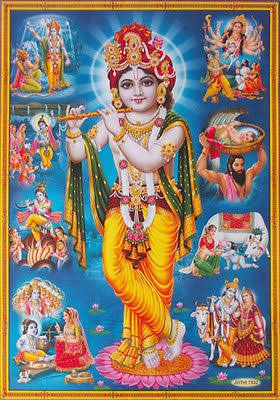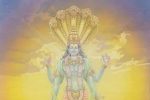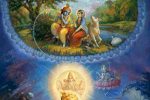Name 98
98. Siddhiḥ सिद्धिः
The reward of being perfect is siddhi. Siddhi generally means attainment of supernatural powers. There is no question of supernatural powers of the Brahman, as all powers originate from Him. In this context siddhi is used to mean the different attributes of the Brahman. When a siddha progresses spiritually, he attains different qualities of the Brahman, broadly said to be of eight types. When a practitioner is very close to realizing Him, such supernatural powers are conferred on him to test his temptations. This is an important point in one’s spiritual journey. If the aspirant chooses to indulge in such siddhis, he will not be able to complete his spiritual journey. He cannot also become a perfect spiritual aspirant, as discussed in the previous nāma. He continues to undergo transmigrations.
Bhagavad Gītā (XVIII.46) explains this: “A person attains perfection when he worships the Lord, the source of all beings and all pervading.” This is the reason why the Brahman is explained as the Supreme Consciousness.
Siddhih – One who bestows Ultimate Bliss
If Siddhah refers to the accomplisher, Siddhih refers to the accomplishment. Thus Bhagavan stands for both, the actor and the action, the doer as well as the deed. According to Sri Adi Sankara, Bhagavan is called Siddhih because of –
His expert knowledge of everything or,
His supremacy in everything or,
His being the ultimate fruit of every pursuit i.e. Moksha.
In other words all other accomplishments can only give lesser benefits such as the worldly joys and the pleasures of heaven, but moksha, the ultimate bliss can only be obtained by earnestly seeking Him.
BG 18.46:
यत: प्रवृत्तिर्भूतानां येन सर्वमिदं ततम् |
स्वकर्मणा तमभ्यर्च्य सिद्धिं विन्दति मानव: || 46||
yataḥ pravṛittir bhūtānāṁ yena sarvam idaṁ tatam.
sva-karmaṇā tam abhyarchya siddhiṁ vindati mānavaḥ
Translation
BG 18.46: By performing one’s natural occupation, one worships the Creator from whom all living entities have come into being, and by whom the whole universe is pervaded. By such performance of work, a person easily attains perfection.
Commentary
No soul is superfluous in God’s creation. His divine plan is for the gradual perfection of all living beings. We all fit into his scheme like tiny cogs in the giant wheel. And he does not expect more from us than the competence he has given to us. Therefore, if we can simply perform our swa-dharma in accordance with our nature and position in life, we will participate in his divine plan for our purification. When done in devotional consciousness our work itself becomes a form of worship.
A powerful story illustrating that no duty is ugly or impure, and it is only the consciousness with which we do it that determines its worth, was told to Yudhishthir by Sage Markandeya, in the Vana Parva of the Mahabharat. The story goes that a young sanyāsī went into the forest, where he meditated and performed austerities for a long time. A few years went by, and one day a crow’s droppings fell upon him from the tree above. He looked angrily at the bird, and it fell dead on the ground. The sanyāsī realized he had developed mystical powers as a result of his austerities. He became filled with pride. Shortly thereafter, he went to a house to beg for alms. The housewife came to the door, and requested him to wait a while, since she was nursing her sick husband. This angered the monk and he glanced angrily at her, thinking, “You wretched woman, how dare you make me wait! You do not know my powers.” Reading his mind, the woman replied, “Do not look at me with such anger. I am not a crow to be burnt by your glance.” The monk was shocked, and asked how she knew about the incident? The housewife said she did not practice any austerities, but did her duties with devotion and dedication. By virtue of it, she had been illumined and was able to read his mind. She then asked him to meet a righteous butcher who lived in the town of Mithila, and said that he would answer his questions on dharma. The sanyāsī overcame his initial hesitation of speaking to a lowly butcher, and went to Mithila. The righteous butcher then explained to him that we all have our respective swa-dharma, based upon our past karmas and competence. But if we discharge our natural duty, renouncing the desire for personal gain and rising above the fleeting happiness and misery coming our way, we will purify ourselves and graduate to the next class of dharma. In this manner, by doing the prescribed duties and not running away from them, the soul gradually evolves from its present gross consciousness to divine consciousness. The lecture the butcher delivered is known as the Vyadha Gita of the Mahabharat.
This message is particularly applicable to Arjun because he wanted to run away from his dharma, thinking it is painful and miserable. In this verse, Shree Krishna instructs him that by doing his prescribed duty in proper consciousness he will be worshiping the Supreme, and will easily attain perfection.
९८. ॐ सिद्धये नमः ।
98. OM Siddhaye Namaḥ
Siddhih -He who is available for recognition (Siddha) everywhere at all points in His nature as Pure Consciousness. Again, Siddhi also means the ‘fruit of action’, and in the context here this would-mean, “He who gives the Infinite fruit of Kaivalya, Moksha.” All other karmas can acquire for us only relative joys of the heavens, but in realizing the Self the seeker gains an ‘Infinite State from which there is no return’, so describes Geeta.
Or His is the ultimate consciousness. There is no other supreme form than His form. Hence He being the One who is such an ultimate blissful consciousness, He himself is known as ‘Siddhi’.
Niratiśayarūpatvād acyutassarvavastuṣu,
Saṃvittvāt phalarūpatvād vā siddhiriti kīrtyate,
Svargādīnām anityatvāt aphalatvaṃ budheritam.
निरतिशयरूपत्वाद् अच्युतस्सर्ववस्तुषु ।
संवित्त्वात् फलरूपत्वाद् वा सिद्धिरिति कीर्त्यते ।
स्वर्गादीनाम् अनित्यत्वात् अफलत्वं बुधेरितम् ॥
The Supreme Lord is of Saṃvid form or one that can only be experienced. Such ultimate experience of a Sādhaka or devotee is what which is ‘Siddhi’. This is a reason why God is known by the divine name ‘Siddhiḥ’.
Or He being the final fruit of a Sādhaka’s devoted efforts, He, the Lord Viṣṇu, is ‘Siddhi’. Of course, there are other sought after results like paradise; but since these are not permanent states, they are not eternally blissful.
INTERPRETATION GUIDED BY SANT VANI (WORDS OF SAINTS)
Siddhiḥ
The accomplishment, success.
He who offers the infinite fruit of Kaivalya (कैवल्य), as he is of the nature of pure-consciousness. He who is the goal of attainment, the state to be attained, and the means to attainment of the state of final sublimation (Śaṅkara). He who is the embodiment of perfection, who is forever in that state of absolute perfection and is the goal/destination as well as the means to that goal/destination (Parāsara Battar).
An autorickshaw driver was recently talking about how he managed to make his life in a city like Mumbai, is married and his children go to English medium school. That was a matter of pride for him and he finally said, ‘Sab Bhagavan ki kripa hai’. (All of this is the Lord’s grace). We hear this often in India. He attributed his accomplishments to Isvara. This is not easy to do. Our identities are so based on our abilities, successes, efforts, relationships and we falsely believe that we call all the shots.
Not only is the Lord siddha, accomplished, but also the siddhi, the accomplishment or success. In every siddhi or success there is Īśvara, because in every success there is joy. That joy is Īśvara. In every action, the possible results are only of four types:
a. Result is equal to what is expected,
b. Result is less than expected,
c. Result is more than expected and
d. Result is different than what is expected.
In any action there are hidden variables that we cannot control. Further, we do not have the power to control every factor. Without expectation, we cannot perform any action and so, we do expect. But at the same time, we have to be aware of the fact that our expectations are based only on what we know and therefore may not always come true. Expectation ≠ Prediction. Therefore, we do what we can and when the result comes, whatever be the four types of results we get, we take it as the prasāda of Īśvara.
Siddhi is Īśvara. When I set up goals without setting myself up, that is karma-yoga. What about asiddhi? When the results don’t match the expectations, that is also Parameśvara, because we learn from it. If I conclude that I am a failure, my mind shuts down and I can wallow in self pity and blame myself and the whole world because there is pain. Constant failure gives a depressed personality with very low self esteem. All my subsequent actions are based on the statement ‘I am a failure’, which is a judgment. There is really no failure, there is only a result. This is being objective because there is something to learn from every experience.
Even if I fail, the failure is accepted as prasāda and instead of calling myself a failure, I try to learn from the experience. It is painful. So what? An emotion is not a person. But we give overwhelming importance to emotions that it overwhelms us, our learning, our experiences and our other accomplishments. We need to focus on what we can learn, because that learning mind is all we carry forward in our different stages of life. We may move to different cities, jobs, relationships may change, possessions are acquired and given away. But the learning and knowledge that I have about life, I carry with me in every situation. That I can learn from an experience is also a siddhi, an accomplishment and that is also within the order of Īśvara. Hence, Bhagavān is called Siddhi. If I achieve success or siddhi and say that it has been given to me, then this is a good attitude of non doer-ship (without karta bhaav).
Again, every siddhi, success is a concept, a judgement, which involves consciousness. Even svarga, heaven, which can be accomplished, is temporary and perishable. But the consciousness, in the concept of heaven and in the concept of heaven-accomplishment, is only an imperishable thing. He is the one who obtains as consciousness in all, He is Siddhi. He is the consciousness in all the forms and yet free of forms.
He is paramānanda-svarūpa, that is, mokṣa, an accomplishment that is nitya and cannot be surpassed. Anything that is caused, even if it is svarga, heaven, is limited. It was not there before and then it came into being. Hence it is anitya. So, gain of these cannot be really called a phalasiddhi, accomplishment. But, Bhagavān is not created by anyone. He is self-existent and hence He is nitya. Hence, Bhagavān is called Siddhi.
A SIDDHAḤ (previous name) who has attained to that perfect state of oneness with the Supreme being is said to have reached the state of SIDDHIḤ.
There is the lesser achievement of acquiring Siddhis (supernatural powers) which come along the path of Yoga but are not really helpful and in fact can lead the seeker astray from the path of attaining the Supreme Being. These are simply strobe lights along the path that can dazzle and can cause the seeker to get into a path that can push back his progress by several generations. The Pātañjali-yoga-sūtras talk about some of these Siddhis as also the Uddhava-gītā (which is part of the Śrīmad Bhāgavatam) – Some of these Siddhis are listed at the end of this post. Both texts however are clear about the need to transcend these Siddhis and not be caught in their illusory delights. It is said that sooner or later every sādhaka meets or comes in touch with one or more of these dvārapālakas (gatekeepers) – they have to be carefully negotiated and the sādhaka must not get sucked into display and arrogance – for that is the sure road to ruin and failure to attain the greater fruit of Kaivalya-Siddhi.
In order to attain the ultimate Kaivalya-Siddhi of union with the Supreme Being, then all the minor Siddhis that glitter as gold along the path have to be ignored as minor trinkets that serve no purpose, for attaining to the Supreme Being is to reach the ultimate Nidhi (treasure house) of that SIDDHAḤ who is the bestower of the greatest SIDDHIḤ – the goal of attainment, the state to be attained, and the means to attainment of the state of final sublimation.
Sri Ramakrishna once advised a monk who had developed a Siddhi or transmitting light from his forearm and used to use it to light up a pathway that was very dark and that the monks had to walk through everyday. Sri Ramakrishna advised him to stop displaying this power and focus on attaining God and realizing the divinity within.
Sri Ramakrishna considered Siddhis as filth and in his typical way used to share stories that drove home this point. One such story is below:
——–Quote
“Once upon a time a sadhu acquired great occult powers. He was very proud about them. But he was a good man and had some austerities to his credit. One day the Lord, disguised as a holy man, came to him and said, ‘Revered sir, I have heard that you have great occult powers.’ The sadhu received the Lord cordially and offered him a seat. Just then an elephant passed by. The Lord, in the disguise of the holy man, said to the sadhu, ‘Revered sir, can you kill this elephant if you like?’
The sadhu said, ‘Yes, it is possible.’ So saying, he took a pinch of dust, muttered some mantras over it, and threw it at the elephant. The beast struggled awhile in pain and then dropped dead. The Lord said: ‘What power you have! You have killed the elephant!’ The sadhu laughed. Again the Lord spoke: ‘Now can you revive the elephant?’ ‘That too is possible’, replied the sadhu. He threw another pinch of charmed dust at the beast. The elephant writhed about a little and came back to life.
Then the Lord said: ‘Wonderful is your power. But may I ask you one thing? You have killed the elephant and you have revived it. But what has that done for you? Do you feel uplifted by it? Has it enabled you to realize God?’ Saying this the Lord vanished. “Subtle are the ways of dharma. One cannot realize God if one has even the least trace of desire.
———Unquote
It’s only when that one single desire to achieve Ishwartva consumes all other desires, with:
- Truthfulness in conduct, speech and actions,
- Purity of intention,
- Devotion and,
- Surrender to the ultimate being does one begin to walk the path loaded with the treasure of True Siddhi. A thread cannot pass through the eye of a needle if it has the smallest fibre sticking out.
Asht Siddhis
1. Anima — ability to become infinitely small like an atom ātma-siddhi — power to be completely unattached and unaffected by material nature
2 Mahima — ability to become huge/gigantic – vividha-siddhi — power to control matter, and minds of others
3.Laghima — ability to become very light like a feather – jñāna-siddhi — ability to remember past incarnations of oneself and of others, and the power to see the future.
4.Garima — ability to become very heavy – tapas-siddhi — perfect control over heat and cold, hunger and thirst, etc.
5. Prāpti — ability to obtain any desire – kṣetra-siddhi — ability to astral travel anywhere in the universe.
6. Prakāmya — ability to become irresistible – deva-siddhi — control over devas, demons, Super Natural elements, nature spirits and others.
7. Iśitva — ability to rule over others – śarīra-siddhi — attainment of physical perfection, to delay the aging process, have perfect health and to heal others.
8. Vaśitva — ability to completely subjugate and control others – vikriya-siddhi — power to accomplish all desires, to change ones appearance into any desired form.
Bhakt Shiromani Sri Hanuman Ji has all the Asht Siddhis and Nav Niddhis which he used only for His Prabhu karya to serve his Lord Bhagwan Shri Ram.
Insightful discourse by Om Swamiji on prerequisites and preparations for achieving success in Mantra Sadhana leading to Mantra Siddhi. PLEASE WATCH.



